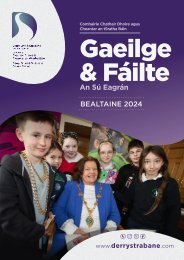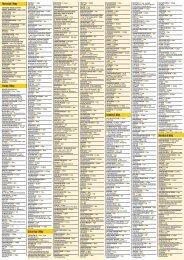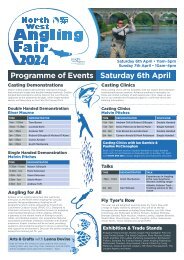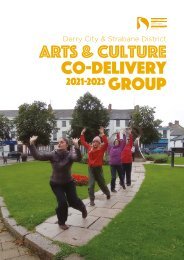Derry City and Strabane District CouncilClimate Change Adaptation Plan 2020-2025
Create successful ePaper yourself
Turn your PDF publications into a flip-book with our unique Google optimized e-Paper software.
Parameter Observed Projected Example of Impacts<br />
Summer<br />
Precipitation<br />
During 2009-2018 summers were<br />
on average 13% wetter than the<br />
1961 -1990 average<br />
(Kendon et al., 2019)<br />
Northern Irel<strong>and</strong> Water experienced<br />
a ‘High Dem<strong>and</strong> Incident’ leading<br />
to the first hosepipe ban in two<br />
decades during the heatwave of<br />
summer 2018<br />
By 2070 (Compared to 1981-2000)<br />
Low Emission Scenario up to 28%<br />
decrease<br />
High Emission Scenario up to 38%<br />
decrease<br />
However future increases in the<br />
fluctuation <strong>and</strong> intensity of heavy<br />
summer rainfall events are projected<br />
(Met Office, 2019)<br />
Reduced river flows affecting<br />
biodiversity <strong>and</strong> water quality<br />
Reduced water supply<br />
Increased risk of wildfire<br />
Rising Sea<br />
Levels<br />
Mean sea level around the UK has<br />
risen by about 16 cm since the<br />
start of the 20th century (when<br />
corrected for l<strong>and</strong> movement)<br />
(Kendon et al., 2019)<br />
Northern Irel<strong>and</strong> is locked in to at<br />
least 11cm sea-level rise by 2100, but<br />
unless global emissions decline, that<br />
number could be as much as 94cm<br />
(Met Office, 2019)<br />
Increased risk of coastal storm<br />
surge <strong>and</strong> storm tide inundation<br />
Significant impact on flood<br />
defences, coastal habitat, urban<br />
centres, agricultural l<strong>and</strong> <strong>and</strong><br />
infrastructure<br />
Frost & Snow<br />
2009–2018 has had 15% fewer air<br />
<strong>and</strong> ground frost days compared to<br />
1961–1990<br />
(Kendon et al., 2019)<br />
Widespread <strong>and</strong> substantial snow<br />
events have occurred in 2018, 2013,<br />
2010 <strong>and</strong> 2009, but their number<br />
<strong>and</strong> severity have generally declined<br />
since the 1960s<br />
(Kendon et al., 2019<br />
A decrease in the frequency of frost<br />
<strong>and</strong> snow is projected<br />
Decrease in transport disruption<br />
Property damage & transport<br />
disruption may occur with<br />
instances of severe frost <strong>and</strong> snow<br />
however projections indicate<br />
increase in average temperatures<br />
Potential benefits to health <strong>and</strong><br />
wellbeing <strong>and</strong> reduced costs for<br />
heating <strong>and</strong> treatment of roads &<br />
paths<br />
DCSDC Climate <strong>Change</strong> <strong>Adaptation</strong> <strong>Plan</strong><br />
19

















